As a service to members, other professionals, and parents, AET records conference presentations and workshops covering a wide variety of topics related to educational therapy.
Viewing Instructions
If you have previously purchased access to a workshop or conference presentation, you must log in to view it.
Past workshop and conference presentations require AET Membership or a guest account to view. If you are an active AET member or have already created a guest account, simply click on the green "View" button to the right of the presentation to log in.
If you are not a member and wish to create a guest login, click here. If you already have a guest account to view our webinars, you do not have to create another account. You may log in with your webinar account.
Please note that once you purchase a workshop or conference presentation you may view it an unlimited number of times at no additional fee.
Recorded Presentations
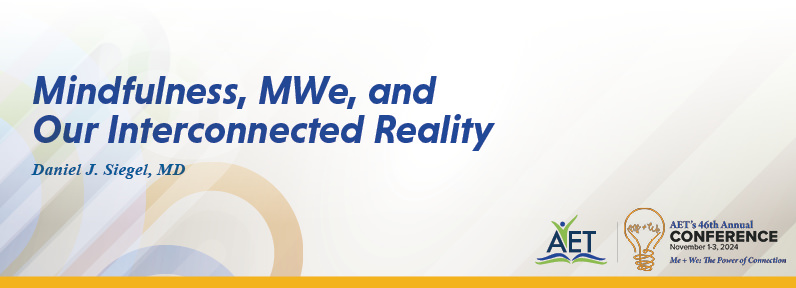 Duration: 161 minutes Who you are is both an internal (Me) and an interconnected (We) self that shapes your identity and sense of belonging. But how can you be both within the body and between the body and in relationship to people and the planet? In this talk we will explore how you can combine an inner “Me” and an inter “We” to become a whole integrated self – a MWe! In many ways, we are more like interconnected verb-like events rather than only noun-like separate entities. The symbolic term MWe integrates the inner aspect of who we are with the interconnected facet of our lives: Me plus We equals MWe. Integration is composed of differentiated aspects being linked without losing the uniqueness of the differentiated components. Me does not get lost in Mwe; it is woven with the equally important differentiated sense of We. With this more integrated sense of our identity, MWe can move forward to cultivate personal, interpersonal, and even planetary health and flourishing.
| Members: $100.00 |
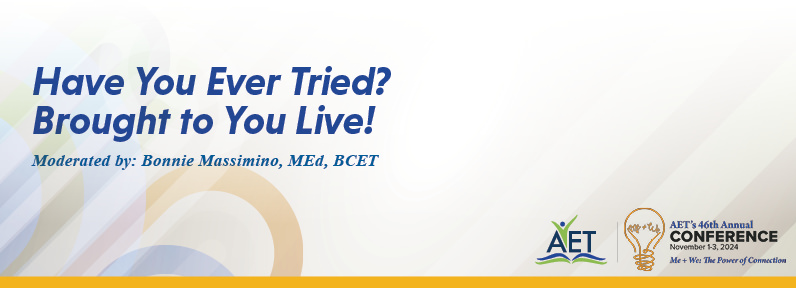 Duration: 82 minutes Have You Ever Tried? Brought to You Live!“Have You Ever Tried? Brought to You Live!” is an informal exchange of favorite techniques, best practices, innovative ideas, games, movement activities, and tried-and-true strategies with our conference attendees. Presenters will share a brief fifteen-minute presentation and a one- to two-page descriptive handout with a detailed summary of their strategy, activity, or tool. Plan to walk away with an array of ideas ready for immediate implementation during your next virtual or in-person session.
| Members: $50.00 |
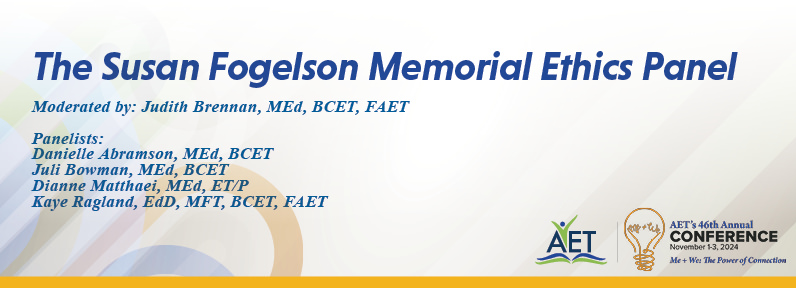 Duration: 180 minutes The Susan Fogelson Memorial Ethics PanelRecognizing and dealing with ethical issues is an essential part of our work as educational therapists. Because we work with complex clients, we often encounter dilemmas that require us to make challenging decisions about what action to take. Each dilemma must be handled ethically and effectively. An ET’s scope of practice can become blurred when clients have complex needs around social and emotional issues. Solutions that best serve some parties involved may conflict with the needs of others. How do you decide what to prioritize? A panel of veteran educational therapists will present real-life scenarios that illustrate ethical dilemmas from their own practices. They will also explain the ethical thought process they used to make decisions about what actions to take. The scenarios will include issues from a variety of practice settings as well as issues related to the scope of practice. Judith Brennan will moderate the presentation and will provide time for related audience questions.
| Members: $100.00 |
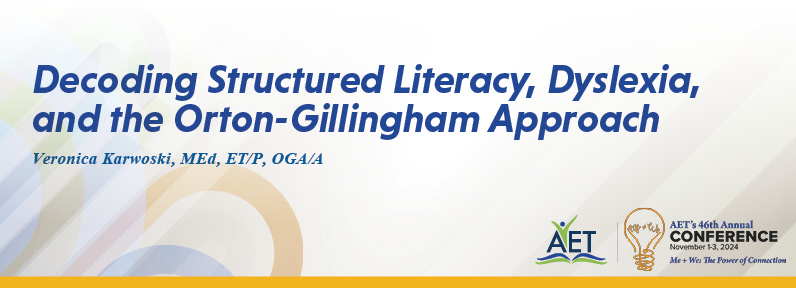 Duration: 80 minutes Decoding Structured Literacy, Dyslexia, and the Orton-Gillingham ApproachLearn practical strategies for teaching struggling readers the foundational literacy skills of decoding, spelling, and reading fluency. This presentation is for all educational therapists but will be especially relevant for those who work with students with dyslexia and co-existing challenges. We will review the components of structured literacy in general and learn why the Orton-Gillingham approach is so effective for students with dyslexia who often struggle with traditional methods and curriculums. The session will discuss how psychological evaluation results and formal and informal assessment tools that ETs can administer help tailor lessons to the individual learner to improve outcomes.
| Members: $50.00 |
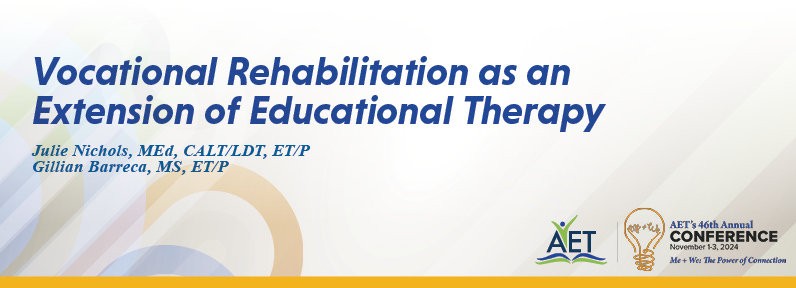 Duration: 85 minutes Vocational Rehabilitation as an Extension of Educational TherapyThe work of a vocational rehabilitation specialist is similar in many ways to the profession of educational therapy, with the age of the client population being one primary distinction. This session will focus on how the two professions overlap in the domain of service delivery and how educational therapists can help develop the skills their adolescent clients will need when they transition to the workforce as adults. State and local Vocational Rehabilitation (VR) departments assist individuals with disabilities in building viable careers and living independently in their communities. Initially, VR is focused on developing “soft skills,” such as communication and social skills, teamwork, attendance, and punctuality. Individuals are also coached on following instructions, remembering routines, time management, and other executive functions. Later in the program, written communication skills are addressed for resume writing and other text-based tasks. During this interactive session, the presenter’s unique experience in both VR and educational therapy will broaden participants’ understanding of the school-to-work obstacles experienced by many of our clients and the interventions that help to overcome those challenges.
| Members: $50.00 |
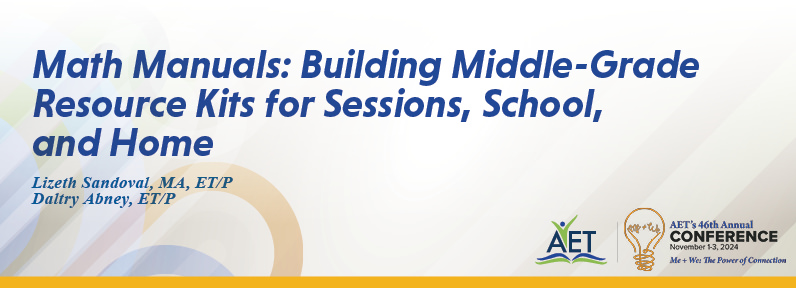 Duration: 74 minutes Math Manuals: Building Middle-Grade Resource Kits for Sessions, School, and HomeAre you struggling with math interventions for middle-grade students with learning disabilities and differences? Do you feel like the current accommodations for your students are not enough? Research-based math interventions often do not address the underlying needs of students with dyscalculia, dyslexia, dysgraphia, processing disorders, and ADHD, which leaves educational therapists little to work with other than student homework. But fear not! Discover a revolutionary solution: our customizable Math Manuals. Packed with print, digital, and online tools, the application hones executive functioning skills crucial for math success. Math Manuals are a single tool the whole team, including educational therapists, teachers, learning specialists, and parents, can use with students. Say goodbye to reinventing the wheel and hello to confident, independent problem-solving.
| Members: $50.00 |
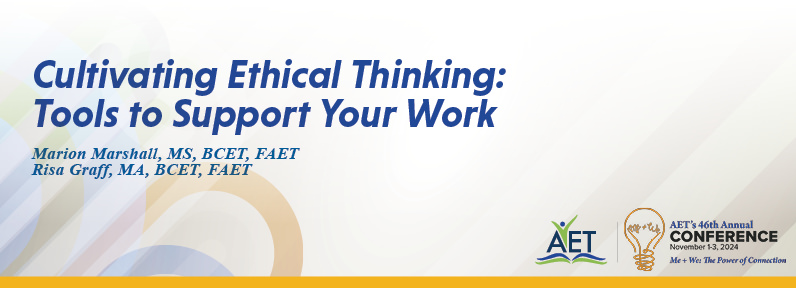 Duration: 86 minutes Cultivating Ethical Thinking: Tools to Support Your WorkEducational therapists face many dilemmas in their work, which may: involve parents, require setting boundaries, relate to the scope of practice, concern business practices, impact your autonomy, necessitate consultation, and include issues with self-care All concerns must be addressed, but to solve each problem, you must clarify what type of issue it presents. Is it a true ethical dilemma or something else? What tools are available to help you solve problems? Marion Marshall and Risa Graff have researched how allied professional organizations address these issues. They will share techniques to help you determine which kind of problem you are facing and offer tools to assist with solutions. Using excerpts from their recently published book, Ethics in Educational Therapy: A Practical Guide (2024), the speakers will ask attendees to unravel the critical elements of the dilemmas described in various scenarios. The presentation will be highly interactive, with ample time for polling, participant questions, and discussion of the process for reaching a solution, ensuring your active participation.
| Members: $50.00 |
![[logo]-AET](/templates/common/images/template/aet-logo-top.png)
![[image]-banner](/images/banners/inner-banner-events.jpg)
Mindfulness, MWe, and Our Interconnected Reality